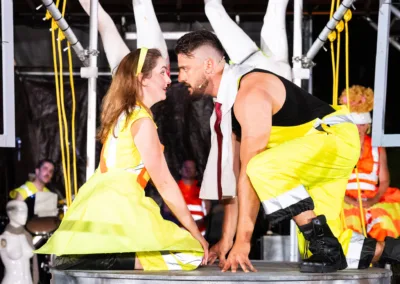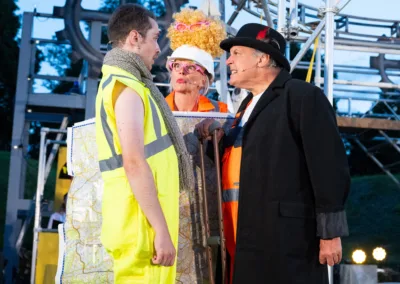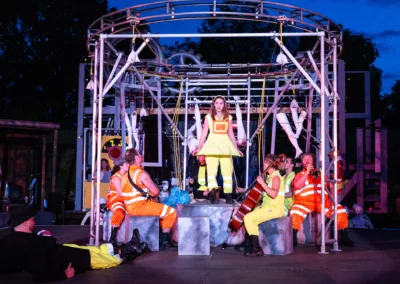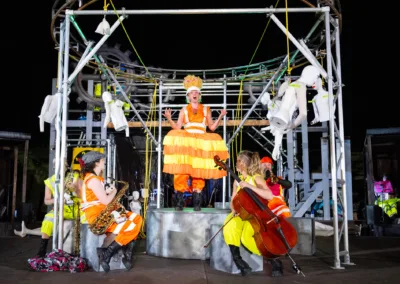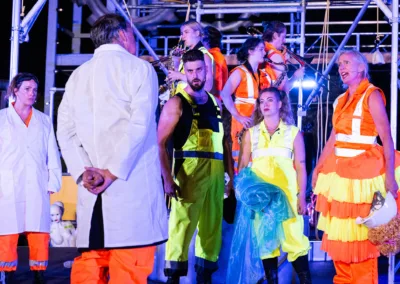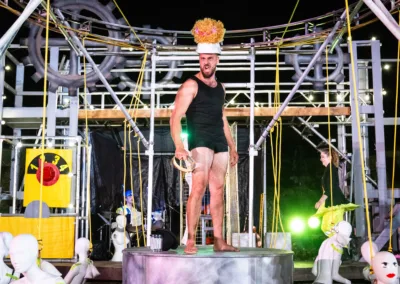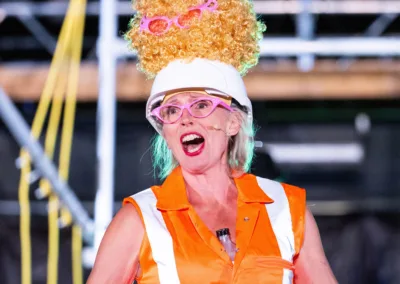Show: The Threepenny Opera
Society: OVO
Venue: Roman Theatre of Verulamium. Bluehouse Hill, St Albans, Hertfordshire AL3 6AE
Credits: Produced by OVO By Bertolt Brecht (text & lyrics) and Kurt Weill (music) in collaboration with Elisabeth Hauptmann English translation of the dialogue by Robert David MacDonald | English translation of the lyrics by Jeremy Sams Directed by Adam Nichols and Co-Directed by Julia Mintzer | Musically Directed and Conducted by Lada Valesova
The Threepenny Opera
2 stars
Photo: Elliott Franks
This is the first open air production of The Threepenny Opera that the Kurt Weill Foundation has given permission for so I suppose there was a lot of pressure to make it special. That might explain the over direction, busy-ness and an apparent lack of trust in the material which isn’t really allowed to speak for itself until well into the second half.
Famously, it’s a response to John Gay’s The Beggars’ Opera, set in the corrupt, murky underworld of 1920s Berlin as a radical, no-holds-barred political comment. It’s timeless and I like the translation by Jeremy Sams and David MacDonald very much.
The production’s greatest strength is Peter Watts as Macheath. He has commanding stage presence, a terrifying sneer, heaps of charisma and a powerful voice. He’s also deliciously “Brechtian” stepping into the audience at one point to “steal” a phone from an audience member and he brings intense physicality to the part. Of course, when he’s in role and within the fourth wall we’re meant to see him as an unscrupulous villain but Watts also manages to factor some vulnerability and even tenderness into this serpentine character. He is well matched by Emily Panes who sings beautifully as Polly Peachum, whom neither we nor Macheath can ever quite trust. She’s convincingly – and by turns – sassy, coy, persuasive and ruthless.
Otherwise there’s a lot of miscasting. Although some of the 15 performers sing well, others don’t and in places the weak intonation is embarrassing. Most of the cast are actor-musicians and normally I’m full of praise for that. In this case, though, everyone seems overstretched as they shift in and out of the three shelters which (sort of) sometimes house the band to take quite big roles. It feels oddly random. And as for musical director Lada Valesova, who hops about and sometimes dances round set and the actors, conducting from all sorts of strange angles – the music would have been much more accurate, rather than woolly and not together as if often is, if all players had been able to see her.
Simon Nicholas’s set comprises a centre stage gasometer (or is it meant to be a bandstand?) which becomes the various unlikely things such as the abatoir where Macheath “marries” Polly. It also obscures sightlines so that musicians can’t see the MD and, worse, so that many of the audience can’t see the action on the balcony or in corners of the main stage. Yes, I know Brecht defied every convention and, in many ways, redefined theatre and the audience won’t be expecting Puccini. But they are still entitled to be able to see what’s going on – and they would probably rather not go home wondering what on earth Mattis Larsen’s apparently random lighting design was meant to contribute.
The applause, at the end of the performance I saw was polite but far from rapturous. It’s a pity because every one of these fifteen performers is talented and has much to offer but they are sold short by this messy production.

First published by Sardines: https://www.sardinesmagazine.co.uk/review/the-threepenny-opera-4/
